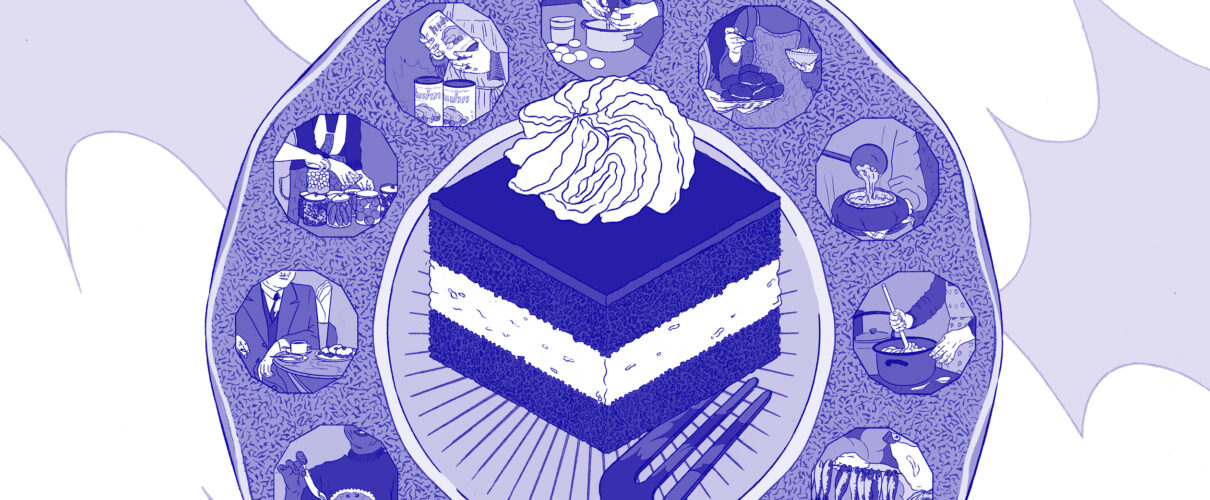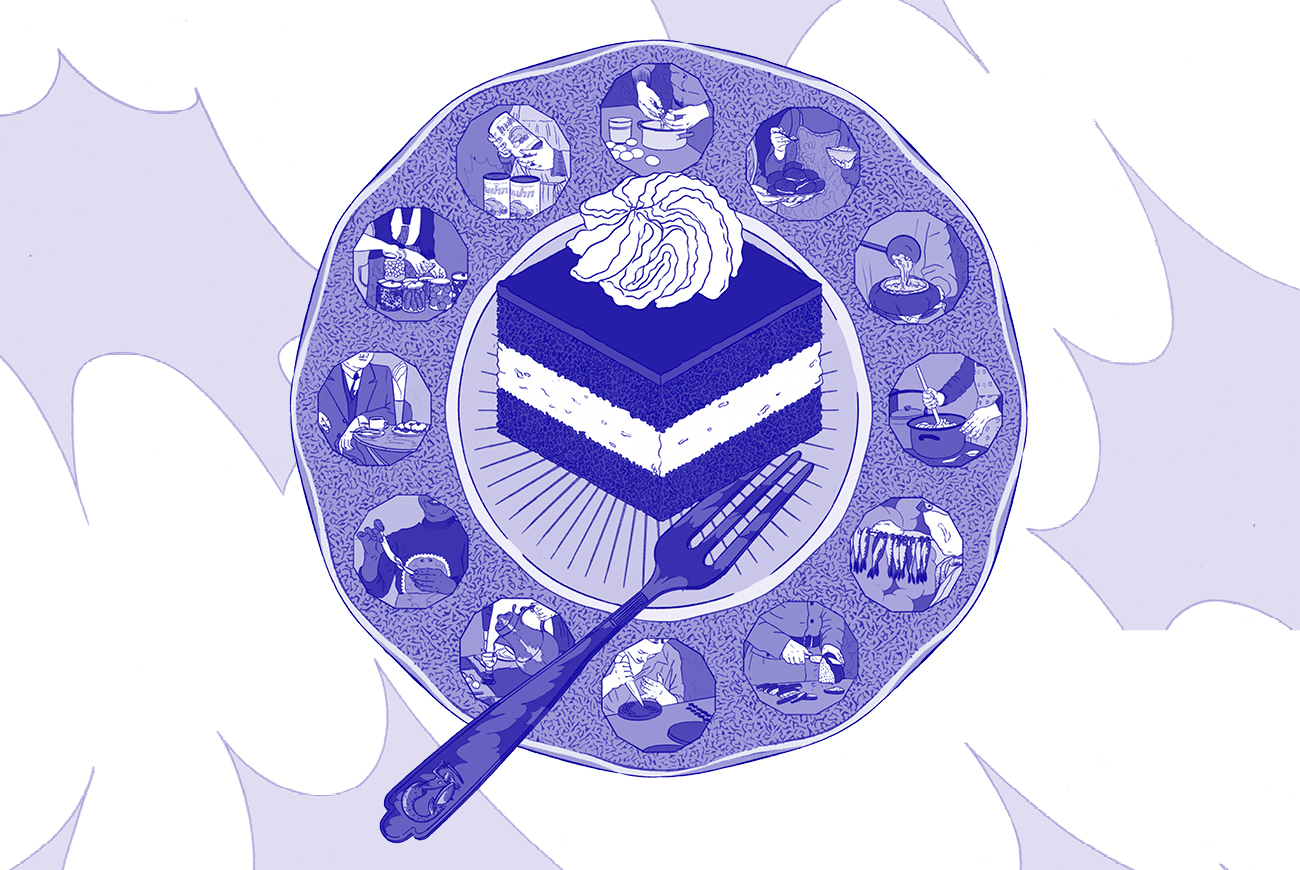EXHIBITIONS

17 October 2024 – 17 April 2025
20 PLN regular / 15 PLN concessions, Thursdays 1 PLN
For Here and To Go. Warsaw’s Cuisine

Cuisine evolution—what and how was consumed in Warsaw throughout the centuries?
The new exhibition tells the city’s culinary history. We show how meals were prepared and served, the most popular dishes, and the places where people dined out. The exhibition presents how these customs changed over the centuries, reflecting social, cultural, and political evolution. Archaeological discoveries, everyday objects, archival materials, photographs, and works of art—both historic and contemporary—guide us through this important sphere of life, from the Middle Ages to the present day.
What was Warsaw cuisine like in the past and what is it like today?
The exhibition For Here and To Go. Warsaw’s Cuisine presents eight centuries of the history of food in Warsaw. Cuisine occupies an important place in the social history of a city. Not only does it illustrate the changes taking place, but it also exerts a significant impact on customs, interpersonal relationships, and urban spaces from medieval times to the present day.
The exhibition narrative develops around home cooking and urban gastronomy. Historic methods of food preparation and storage are illustrated by objects from archaeological excavations. Kitchen innovations began as late as the early 19th century, and these can also be traced through artefacts like the first gas stoves or appliances such as ice-cream makers, mixers, slicers, and electric kettles.
A display on a large dining table in one of the rooms will demonstrate how important to culture is what we eat. The way dishes are served is an expression of identity. The exposition also features one of the first editions of Lucyna Ćwierczakiewiczowa’s legendary cookbook titled 365 Obiadów za 5 Złotych (365 Dinners for 5 Zlotys).
The subsequent sections of the exhibition are dedicated to the activities of charitable institutions and to street food. The origins of street food—very trendy nowadays—date back to the Middle Ages. Visitors to the exhibition will learn how dishes served outdoors have evolved, as well as what handelki and bawarie were, and how collective dining developed. Café gardens and sharing treats during picnics by the Vistula River also boast a long tradition. The final section of the exhibition focuses on eating outdoors, both in the past and today.
For Here and To Go exhibition offers not only a historical perspective, but also a view of the present-day. Selected artworks by Bettina Bereś, Dorota Podlaska, Rafał Milach and Pola Dwurnik testify to the important role of preparing and consuming food. Street food, old-time kitchens, eateries and picnics are depicted in drawings by Jan Piotr Norblin, Franciszek Kostrzewski and Henryk Pillati, and in photographs taken by Konrad Brandl or Aleksander Minorski.
TOURING WITH A CHILD
Anyone can relate to the subject matter of the exhibition, also our youngest visitors. That is why, in some places, the display seems to seamlessly transition into play & learn areas. Next to the sizeable table on which place settings from different eras are displayed, a space for creative activity has been arranged where children can compose their own ‘meals’ using magnets. Towards the end of the exhibition, visitors will also have an opportunity to compose a menu for the ‘Museum of Warsaw’s food truck.’
That is by no means the end of attractions for children. The exhibition can be explored with a cards with tasks.
How does it work? Having purchased the tickets, approach a member of staff in the exhibition hall and collect a card with tasks and crayons.
Solve the riddles while touring the exhibition and, above all else, have a great time!
For whom: families with children aged 7–10
KOLOFON
kuratorki / curators Zuzanna Różańska-Tuta, Lena Wicherkiewicz
projekt wystawy / exhibition design Kosmos Project
produkcja / production Monika Mazurek
projekt graficzny / graphic design Katarzyna Łygońska
przygotowanie reprodukcji do druku / preparing reproductions for printing Kaja Gliwa
ilustracje / illustrations Marta Tomiak
projekt plakatu / poster design Joanna Bębenek
tłumaczenie / translation Karol Waniek
redakcja i korekta / editing and proofreading Urszula Drabińska
realizacja / implementation Artmontage – Studio Alena Trafimava, Michał Bogumił, Ksenia Góreczna, Jolanta Górska, Paweł Grochowalski, Krzysztof Hernik, Piotr Lipiński, Krzysztof Kwiatkowski, Artur Miniewicz, Katarzyna Radecka, Tomasz Raubo, Leszek Sokołowski, Dariusz Sałański
opieka konserwatorska / conservation Beata Galperyn-Kołodziejska, Piotr Kaczkiełło, Julia Kłosińska, Robert Kołodziejski, Katarzyna Lesiakowska-Tofil, Janusz Mróz, Igor Nowak, Karolina Nowicka, Piotr Popławski, Adam Wrzosek
koordynacja digitalizacji / digitization coordinator Mikołaj Kalina
wypożyczenia zewnętrzne / external loans Janusz Kurczak
wypożyczenia wewnętrzne / internal loans Tomasz Lewandowski, Zuzanna Sieroszewska-Rolewicz, Joanna Rykiel, Dorota Parszewska, Aleksandra Lis, Klaudia Jaraszek, Małgorzata Oliwińska, Kamila Utrata, Łukasz Sobierajski, Filip Żelewski
pozyskiwanie środków zewnętrznych / acquisition of external funds Agata Hofman, Marzena Michałek-Dąbrowska
program edukacyjny – dział edukacji / educational program – Education Department Krystyna Stroynowska, Monika Michałek, Aleksandra Kresowska, Anna Marta Zdanowska, Paula Kuch, Edyta Gołębiowska, Karolina Sawicka
program towarzyszący / accompanying program Dorota Stolarska-Kultys, Tomasz Krajewski
komunikacja i marketing / communications and marketing Agata Fijałkowska, Daniel Karwowski, Anna Ładna, Aleksandra Migacz, Nela Sobieszczańska, Jowita Purzycka, Milena Soporowska




